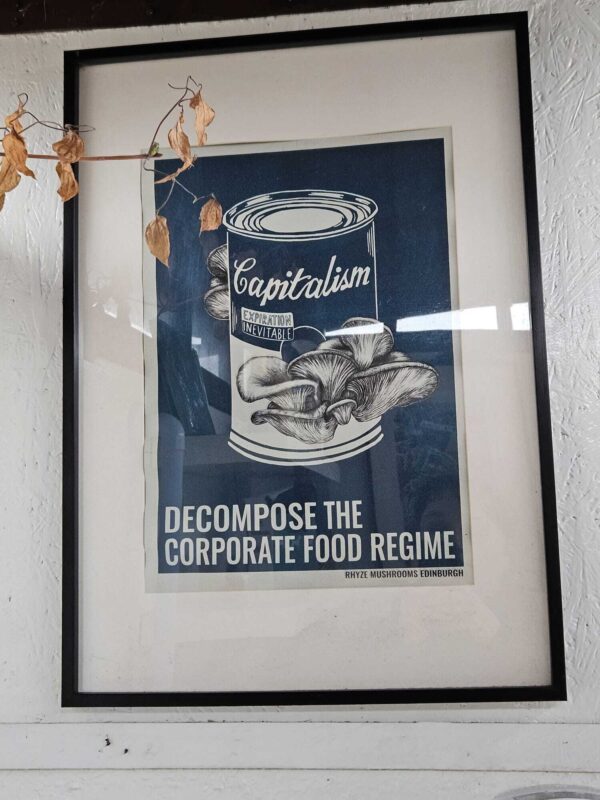- News
Decompose the Corporate Food Regime
Closed loop systems and anti-capitalist approaches at The GalGael Trust
It was a nippy morning when I and my colleague Rebecca Reynolds arrived at GalGael’s Garden and the Ibrox Commons. Tucked away in an old warehouse, GalGael is many things and hard to define: a centre for community to gather; a place to learn new skills from boatbuilding to sauna construction; a warm place to share meals. Despite the temperature, both the Garden and the workshop were brimming with activity. We visited to talk about their recent composting project on the Commons which Glasgow Community Food Network supported with money from our Composting for the Future Budget, but we ended up talking about much more.
I quickly realised that this project is more than just about generating free, good quality soil for growing food. It’s about challenging capitalism, the climate crisis and social isolation. Nick Trull, Community Gardener at The GalGael Trust said, “I think people are generally all for a closed system. The very nature of GalGael is a front to capitalism and [composting] is a very anti-capitalist act, in an attempt to become more self-sufficient... just using natural resources in a way which isn't overly extractive, just using renewables.”

The Trust already has a sophisticated composting approach in The GalGael Garden with both hot and cold composting systems in place. This is easier for the team to manage, being within the main outdoor space of GalGael and managed by the staff. The system Glasgow Community Food Network has supported in the Ibrox Commons is a new approach for them. David Lees, Operations Support and Nick talked us through the set-up which will allow members who manage the raised beds access to not only the composting system but a rainwater collection system as well. People who have access to the beds will receive a code for opening the gates which will guard the composting bays, along with a tool store box for communal use. Users will be inducted into the system to ensure no incorrect waste is left in there.
The vary nature of their approach to their composting set-up speaks to the broader ethos of the Commons and the Garden. Like some strange Victorian invention which does many things (I’m thinking of the public clock on the Greenock waterfront which not only told the time but acted as a post box and water fountain), the composting unit both services a multitude of needs as well as jigsaw-ing into many other symbolic actions. It is a sign of solidarity and communality, climate action, and of empowerment despite oppressive financial and political landscapes. Visible from the grey clad high flats across the way, the Garden and Commons are a wellspring of diversity, softness and connection to land.
“There's a hell of a lot of people who come into the garden. We've just had some bird boxes made, all sorts of things. Suggestions for doing biological recording sessions. People really see the benefit of nature which is such a juxtaposition which the very concrete-y, very contaminated area” said Nick.
GalGael always has something exciting to get involved with as a visitor or volunteer. Take a look at their website, www.galgael.org to find out more. And while you’re there make sure to pop into the compost loo, complete with a poster from Rhyze Mushrooms in Edinburgh which defiantly states, “Capitalism; expiration inevitable. Decompose the corporate food regime”.
- Rebecca Livesey-Wright, Communications Officer, Glasgow Community Food Network
